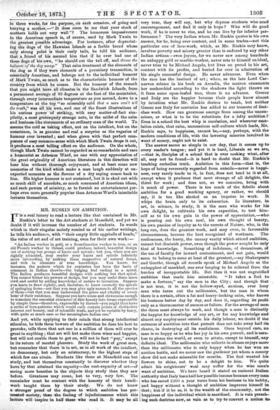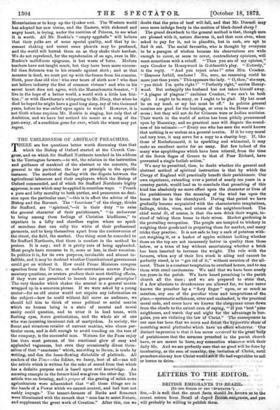MR. RUSKIN ON AMBITION.
IT is a real luxury to read a lecture like that contained in Mr. Raskin's letter to the Art students at Mansfield, and yet we doubt if it will increase the number of Art students. In words which in their singular melody remind us of his earlier writings, he tells his audience, with "their empty little eggshells of heads," the value of art and of art training, even for their own work:— "An Indian worker in gold, or a Scandinavian worker in iron, or an old French worker in thread, could produce, indeed, beautiful design out of nothing but groups of knots and spirals ; but you, when you are rightly educated, may render your knots and spirals infinitely more interesting, by making them suggestive of natural forms, and rich in elements of true knowledge. You know, for instance, the pattern which for centuries has been the basis of ornament in Indian shawls—the bulging leaf ending in a spiral. The Indian produces beautiful designs with nothing but that spiral. You cannot better his powers of design, but you may make them more civil and useful by adding knowledge of nature to invention. Suppose you learn to draw rightly, and, therefore, to know correctly the spirals of springing ferns—not that you may give ugly names to all the species of them—but that you may understand the grace and vitality of every hour of their existence. Suppose you have sense and cleverness enough to translate the essential character of this beauty into forms expressible by simple lines—therefore, expressible by thread—you might then have a series of fern-patterns which would each contain points of distinctive interest and beauty, and of scientific truth, and yet be variable by fancy, with quite as much ease as the meaningless Indian one."
And yet, while applying to their minds that strong intellectual stimulus, he bids them beware of the ambition he does his best to provoke, tells them that not one in a million of them will ever be great in anything ; that art will but make them wiser and happier, but will not enable them to get on, will not in fact "pay," except in its return of mental pleasure. Study the work of great men, but remember that there is in art, as in all work of the intellect, no democracy, but only an aristocracy, to the highest steps of which few can attain. Students like those at Mansfield can but study, and test themselves constantly to discover whether they have by that attained the capacity—the root-capacity of art—of seeing more beauties in the objects they study than they saw before. Greatness may come, but to very, very few. The remainder must be content with the honesty of their handi- work taught them by their study. We do not know a stronger proof of the degree to which ambition has per- meated society, than the feeling of injudiciousness which this
lecture will inspire in half those who read it. It may be all
very true, they will say, but why depress students who need encouragement, and find it only in hope ? Who will do good work, if he is never to rise, and he can live by far inferior per- formance? The very Indian whom Mr. Raskin quotes is his own answer, for he, being ever content, and in some trades—not this particular one of lace-work, which, as Mr. Ruskin may know, involves poverty and misery greater than is endured by any other Indian artisan—even joyous, for we never saw among hundreds an unhappy gold or marble-worker, never seta to himself an ideal, never tries to be Michael Angelo, but lives on proud in his art, content with its profits, and buried for ever in admiration of his single successful design. He never advances. Even when the race has the instinct of art ; when, as the late Lord Car- narvon relates in his book on Arcadia, the matron ornaments her neckerchief according to the shadows the light throws on it from some open-leafed tree, there is no advance. Greece and Italy are the happier because their people know almost by intuition what Mr. Ruskin desires to teach, but neither Greece nor Italy for centuries has added to our treasure of first- class work. How can greatness emerge from among the uncon- scious, or what is to be the substitute for a lofty ambition? Even in a school the best whip is emulation, and wherever emu- lation exists, that calm, unconscious self-culture which leads, Mr. Ruskin says, to happiness, cannot be,—nay, perhaps, with the modern conditions of life, with the lowering miseries involved in want of money, ought not to exist.
The answer seems so simple in our day, that it comes up to every reader's tongue ; and yet it is hard, Liberals as we are, —that is, disciples of a school that is ever seekieg what, after all, may not be found—it is hard to doubt that Mr. Ruskin's teaching embodies truth. Ambition in this form—that is, the hope of being reverently regarded from outside—never is happi- ness, very rarely tends to it, in fact, does not tend to it at all, except when it produces that most strange of all delights, the thirst for work ; and does not, as we conceive, bring with it much of power. There is too much of the febrile about ambition for a good working agency, or rather, we should
say, it is too like alcohol as an impetus to work. It whips the brain only to its exhaustion. In literature, in art, in science, in study, it is the man who works for his own delight, to cultivate his own capacities, to test him- self as to his own gain in the power of appreciation,—who is pouring out his own soul, his own thought of beauty, his own passion of inquiry as to the secrets of Nature, who, in the long run, does the greatest work, and may even, in favourable circumstances, become the best recognised of workmen. The restlessness, the hurry, the uneasy vanity which attend ambition, cannot but diminish power, even though the power sought be only that of knowledge. Something of indolence, of dreaminess, of the use of faculty for inward contentment, and not gain, would seem to belong to some at least of the greatest,—say Shakespeare and Goethe, though all records speak of Michael Angelo as the unhappiest of mankind, one ever longing to be relieved from the burden of insupportable life. But then it was not ungratified ambition that made him miserable. "It takes a fool to make a fortune," say the men in the City ; and though that is not true, it is not the hollow-eyed, anxious, ever busy man who turns out the millionaire, but the man in whom there is a certain, often a fat and heavy-looking calm, who knows his business better day by day, and does it, regarding its profit only as a thermometer of success or failure. For the averageof men the doom must always be work, and though a man is distinctly the happier for knowledge of any art, or for any knowledge and almost any employment outside his daily labour, we doubt if the entrance of ambition into that pursuit does not take away half its charm, in destroying all its restfulness. Once beyond care, no man is so happy as he who has joy in his own pursuit, and is care- less to please the world, or even to attain, except to himself, any definite ideal. The millionaire who collects in silence enjoys more than the millionaire who is only happy when he has won an auction battle, and we never saw the gardener yet whom a county show did not make miserable for months. The fool wanted his flowers to shine, not to be a delight to him. We quite admit his neighbours' weal may suffer for the wise man's want of ambition. We have heard it stated on eminent Italian authority that Italy loses half her possible income because every man who has saved £200 a year turns from his business to his hobby, and happy without a thought of ambition improves himself in that ; but if it be so, it is the wealth of the community, not the happiness of the individual which is sacrificed. It is vain preach- ing such doctrine now, as vain an to try to convert a nation ko Moravianism or to keep up the Quaker sect. The Western world has adopted her new virtue, and the Eastern, with sickened and angry heart, is trying, under the coercion of Princes, to see what it is worth. All Mr. Ruskin's "empty eggshells" will believe that their yolks are of some special quality, and that by in- cement shaking and unrest some phceaix may be produced, and the world will hurrah them on as they shake their hardest. We do not reprehend, for the reprehension of an age, even in Mr. Ruskin's mellifluous epigrams, is but waste of force. Modern teachers have not taught much, but they have been more success- ful than Solomon was in his crusade against sloth ; and as that monster is dead, we must put up with the fumes from his remains. Sloth, poor dear old vice ! who ever bears of sloth now ? who does not believe industry the first of common virtues? and who in his secret heart does not agree, -with the Massachusetts Senator, " I Jive in the hope of a better world, a world with a little less fric- tion ;" or with Hawthorne's whispering to Mr. Dicey, that when he died he hoped he might have a good long sleep, say of two thousand years, before he was called upon again to work ? However, it is not Sloth whose requiem Mr. Ruskin is singing, but only that of Ambition, and we have but noticed his music as a song of the past-away, of a condition gone for ever, which the wisest may yet regret.



































 Previous page
Previous page